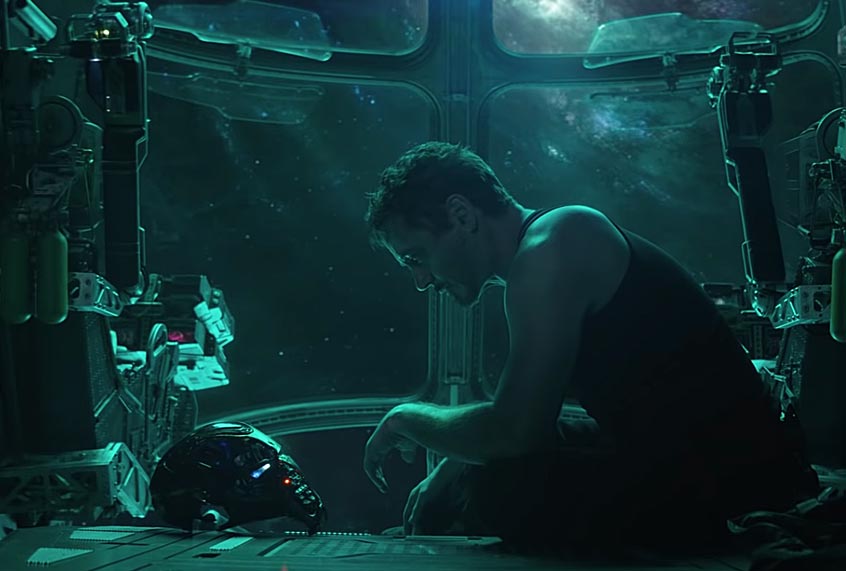When I reviewed “Avengers: Infinity War” in April, my main disappointment was the fact that the film’s cluttered storyline prevented it from focusing on any of the potential interesting subplots in its overly-packed narrative. Even though this was a minority view among critics (“Avengers: Infinity War” has an 84 percent rating on Rotten Tomatoes), it’s one I feel is important not only for the Marvel Cinematic Universe, but for blockbuster franchises in general: If the movies are going to be good, it must be because they concentrate on their characters as much as they do on action set pieces and special effects.
This brings us to the trailer of “Avengers: Endgame,” which has broken viewing records since it was released last week and seems to be steering the franchise in the right direction.
The first positive sign in this trailer is that the cast of characters in the “Avengers” series seems to have been narrowed. This was inevitable given the end of the previous film, which — as the trailer spoils in case you haven’t already seen that movie — concludes with half of all living creatures being killed. While that was emotionally devastating for fans of the series, it may be a boon for the follow-up film, which will now be able to focus on a handful of characters rather than an entire superhero pantheon.
Several details from the trailer suggest that it is heading in this direction. There is the prolonged opening, where Tony Stark/Iron Man (Robert Downey Jr.) leaves a message to his fiancée Pepper Potts (Gwyneth Paltrow) as he drifts aimlessly through space with no hope of rescue, expecting to die. This lasts for almost a minute — a remarkably long time in a series that has taken to shortchanging introversion for kinetics whenever it can — and is followed by a series of scenes in which surviving characters like Steve Rogers/Captain America (Chris Evans), Natasha Romanoff/Black Widow (Scarlett Johansson), Bruce Banner/Hulk (Mark Ruffalo) and Thor (Chris Hemsworth) cope with the feeling of failure after having not only lost to Thanos (Josh Brolin), but allowed billions, if not trillions, of lives to be lost in the process.
Even though dialogue is sparse during these clips, save for obligatory lines emphasizing the solemnity of the moment (most notable among them is Evans saying that he won’t know what to do if some as-of-yet unrevealed plan doesn’t work), the shots themselves are still encouraging. It seems like the movie is going to take its time allowing superheroes who aren’t used to losing not only to absorb the reality of defeat, but the agonizing consequences of having done so at the expense of their most fundamental mission. The fact that each of them has almost certainly lost loved ones in the process must add pounds of salt to their emotional wounds.
This may be dark and heady for a film that will doubtless be seen by children, but it is intriguing and promises to take the potential of “Avengers: Infinity War” and actually capitalize on it by concentrating on the small and accessible instead of the grandiose. That said, there is only one way for this story to really stick after it has left cineplexes next year — for at least some of that pain to actually last.
As I also noted in my review of “Avengers: Infinity War,” one of the logical problems with its ending is that discerning filmgoers know it won’t last. Sequels have already been confirmed for the “Spider-Man,” “Black Panther” and “Guardians of the Galaxy” franchises, so it is logically impossible for those characters to remain dead despite having turned to dust in the “Avengers: Infinity War” finale. At some point a great resurrection will occur and, when it does, the new film could very easily lead to an unequivocally happy ending.
This would be extremely unfortunate. While a good superhero film should always end on a happy note (at least if it’s not based on a story written by Alan Moore or Frank Miller), one of the biggest flaws of the Marvel Cinematic Universe is that major heroic or antiheroic characters who seem intended to die rarely stay dead (looking at you, Loki), meaning that moments meant to have dramatic heft rarely do so. The only notable exception to this was Yondu (Michael Rooker) in the second “Guardians of the Galaxy” film, but even though that death was poignant, Yondu is hardly as much of a Marvel icon as one of the main superhero characters.
If the theme of the last two “Avengers” movies is really meant to be sacrifice and bringing one chapter to a close, then it will be necessary for someone to pay the ultimate price in order to save the universe. Who that will be or how that will happen is a matter best left to the writers, but if it doesn’t occur at all, the new “Avengers” film will have squandered its opportunity to leave a mark after the credits have started rolling.


